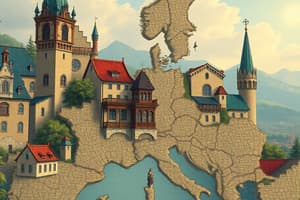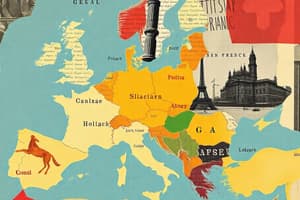Podcast
Questions and Answers
What bodies of water border Europe to the south?
What bodies of water border Europe to the south?
- Red, Caribbean, and Arabian seas
- Pacific, Indian, and Southern oceans
- Atlantic, Arctic, and Baltic seas
- Mediterranean, Black, and Caspian seas (correct)
Which of the following is NOT one of the peninsulas found in Europe?
Which of the following is NOT one of the peninsulas found in Europe?
- Scandinavian
- Arabian (correct)
- Jutland
- Balkan
What was established in 1957 and later evolved into the EU in 1993?
What was established in 1957 and later evolved into the EU in 1993?
- North Atlantic Treaty Organization
- World Trade Organization
- European Economic Community (correct)
- United Nations
Which climate type is found in the north of Europe?
Which climate type is found in the north of Europe?
What percentage of the world's population resides in Europe?
What percentage of the world's population resides in Europe?
What is Europe often described as due to its historical significance?
What is Europe often described as due to its historical significance?
What aspect has been a dominant force in Europe throughout history?
What aspect has been a dominant force in Europe throughout history?
Why is Europe particularly vulnerable to trade disruptions?
Why is Europe particularly vulnerable to trade disruptions?
What reflects Europe's ongoing pursuit of unity and cooperation in the face of global challenges?
What reflects Europe's ongoing pursuit of unity and cooperation in the face of global challenges?
Which ancient civilizations are mentioned as part of Europe's rich and complex history?
Which ancient civilizations are mentioned as part of Europe's rich and complex history?
What is the EU leveraging to build resilience against trade challenges?
What is the EU leveraging to build resilience against trade challenges?
Flashcards are hidden until you start studying
Study Notes
Europe
Europe, the second-smallest continent, is a peninsula of peninsulas. It is bordered by the Arctic Ocean to the north, the Atlantic Ocean to the west, and the Mediterranean, Black, and Caspian seas to the south. Europe has a diverse geography, with a mix of mountains, forests, rivers, and coastlines.
Population and Geography
Europe is home to over 740 million people, making up about 10% of the world's population. The continent is mainly made up of peninsulas: the Iberian, Italian, Balkan, Scandinavian, and Jutland peninsulas. The European Union (EU) is a significant political and economic entity, comprising 27 European countries.
Climate
Europe has a variety of climates, ranging from the cold Arctic climate in the north to the Mediterranean climate in the south, with rainforest, desert, and steppe climates found in between. The continent experiences all four seasons, with temperatures varying greatly depending on the region.
Economy
Europe is one of the world's most economically advanced regions, with a diverse mix of manufacturing, agriculture, and service industries. The European Economic Community was established in 1957, later evolving into the EU in 1993. Today, the EU is one of the world's largest economic entities, with a strong focus on cooperation and integration between its member states.
Cultural Significance
Europe is often described as the birthplace of Western Civilization and is home to many of the world's oldest cities and historical landmarks. It has been a dominant cultural, economic, and social force throughout history, with a rich heritage in arts, music, and literature.
Challenges and Fragmentation
Despite its strengths, Europe faces significant challenges. The continent is highly open to trade, which makes it particularly vulnerable to trade disruptions. Additionally, Europe is heavily dependent on countries that are not politically aligned with the EU, such as China. The EU is working to build resilience against these challenges, leveraging its large and diverse membership to support innovation and manufacturing.
History
Europe's history is rich and complex, dating back to ancient civilizations like Greece and Rome. The continent has seen numerous conflicts, revolutions, and cultural shifts, shaping its modern political borders and cultures. The rise of the EU in the latter half of the 20th century reflects Europe's ongoing quest for unity and cooperation in the face of global challenges.
Studying That Suits You
Use AI to generate personalized quizzes and flashcards to suit your learning preferences.




